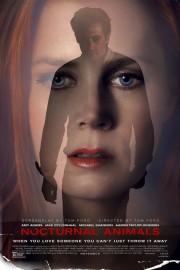Nocturnal Animals
While his leading man, Colin Firth, was nominated for an Oscar for his performance in “A Single Man,” I don’t know of anybody who really loves fashion designer Tom Ford’s first film as a director. He has a great eye for color and visual schemes in terms of cinematography and costume design, but what memories I have of that film are it being pretty flat from a dramatic standpoint, with Firth’s performance helping make the film stand out. Seven years later, Ford has finally released a second film, and while it has many of the same issues as his first, there’s plenty more dramatic fireworks to drive the film home, even when it seems to be inert emotionally, starting with the two lead performances.
Nineteen years ago, Susan (Amy Adams) was married to Edward Sheffield (Jake Gyllenhaal), whom she reconnected with while in grad school. She had aspirations to be an artist, while he wanted to be an author. At some point, that marriage ended, and she has since been married to a businessman, Hutton (Armie Hammer), while she pursues her artistic desires. When we see her first, she has an opening at the gallery she runs. It goes well, but Hutton was not able to make it between work obligations. She doesn’t seem to happy about anything. They have a lot of art that has been purchased that is still in the boxes, and Susan is clued in to the local art scene, but she feels something amiss at home. She gives their house staff the weekend off, hoping Hutton is able to go away. Alas, work in New York beckons, although we get the impression early on that it’s more than that for him. That actually works well for Susan, however, as she has gotten a surprise package from Edward, whom she has not seen in almost 20 years. It is a proof of his first novel, Nocturnal Animals, and it is dedicated to him. The title comes from a name Edward had for Susan, who has difficulty sleeping. Part of the reason she left Edward was she was concerned about his ability to make a living for them. However, as she reads, she sees a significant impact their relationship, and how it ended, had on him. He’s in town and wants to get together. She is inspired to agree.
Your ability to watch the opening credits, with obese women, naked, dancing like cheerleaders with some props, will be a good gauge as to how far your go with “Nocturnal Animals.” Those credits seem random, but the context is revealed that they are part of an art opening Susan’s gallery is hosting. It is never explained, but there really is no explanation needed- we see Susan as a creature of high-minded artistic sense and snobbery. We see her and Hutton at a party thrown by two friends (Michael Sheen and Andrea Riseborough), and recognize that she is a walking cliche of how we see modern artists. We see that her marriage to Hutton, who is younger than her, is an unhappy one, and after Susan has her suspicions about infidelity on his part confirmed in a phone call, he never enters the picture again. That is perfectly fine, because the drive of the film, on an emotional level, becomes her memories of her time with Edward that come rushing back while reading his book. One of these include a scene with her conservative, well-off mother (Laura Linney, with makeup and dress creating the illusion, with her performance doing the rest of the work), where she tells Susan that she will not be able to live the type of life she wants with Edward, and it won’t last if she marries him. Sure enough, that is exactly the couple’s downfall, although a dagger Susan twists in Edward at the end is what no doubt led to his book, which we see unfold. It’s about a husband and father (played by Gyllenhaal) who is making a late-night trip across Texas with his wife (Ilsa Fisher) and daughter (Ellie Bamber) when they are run off the road by a group of men (led by Aaron Taylor-Johnson’s Ray Marcus), and who then kidnap his wife and daughter, leave him in the middle of nowhere, and rape and kill them. The rest of the book is about the investigation Tony, the main character, goes on with Bobby Andes, played by Michael Shannon, to catch the culprits. Susan is riveted by the book, but also devastated- she doesn’t say it, but we can tell she sees herself in the wife, and a daughter they lost in the daughter (although Susan does have a daughter she calls in the middle of reading- we guess she had her with Hutton, but it’s left open to interpretation). Edward, who feels too much, and Susan, who doesn’t feel enough, are the emotional core of the film, and Gyllenhaal and Adams are fantastic in their respective roles. We get a full portrait of each character, which is particularly impressive for Edward, since we have mainly Susan’s memories (and the scenes of Edward’s book) to go off of, and we understand them from the inside out. It all culminates into the final moments of the film, where Susan and Edward agree to meet. It is appropriately painful to watch, and one of the most unforgettable closes to a film this year. Ford may excel at creating images, first and foremost, but when he allows his actors to apply their craft, his films dig deep. “Nocturnal Animals” feels like style over substance, but if you look closer, you see the dark center of the story come through in the faces of its stars.










